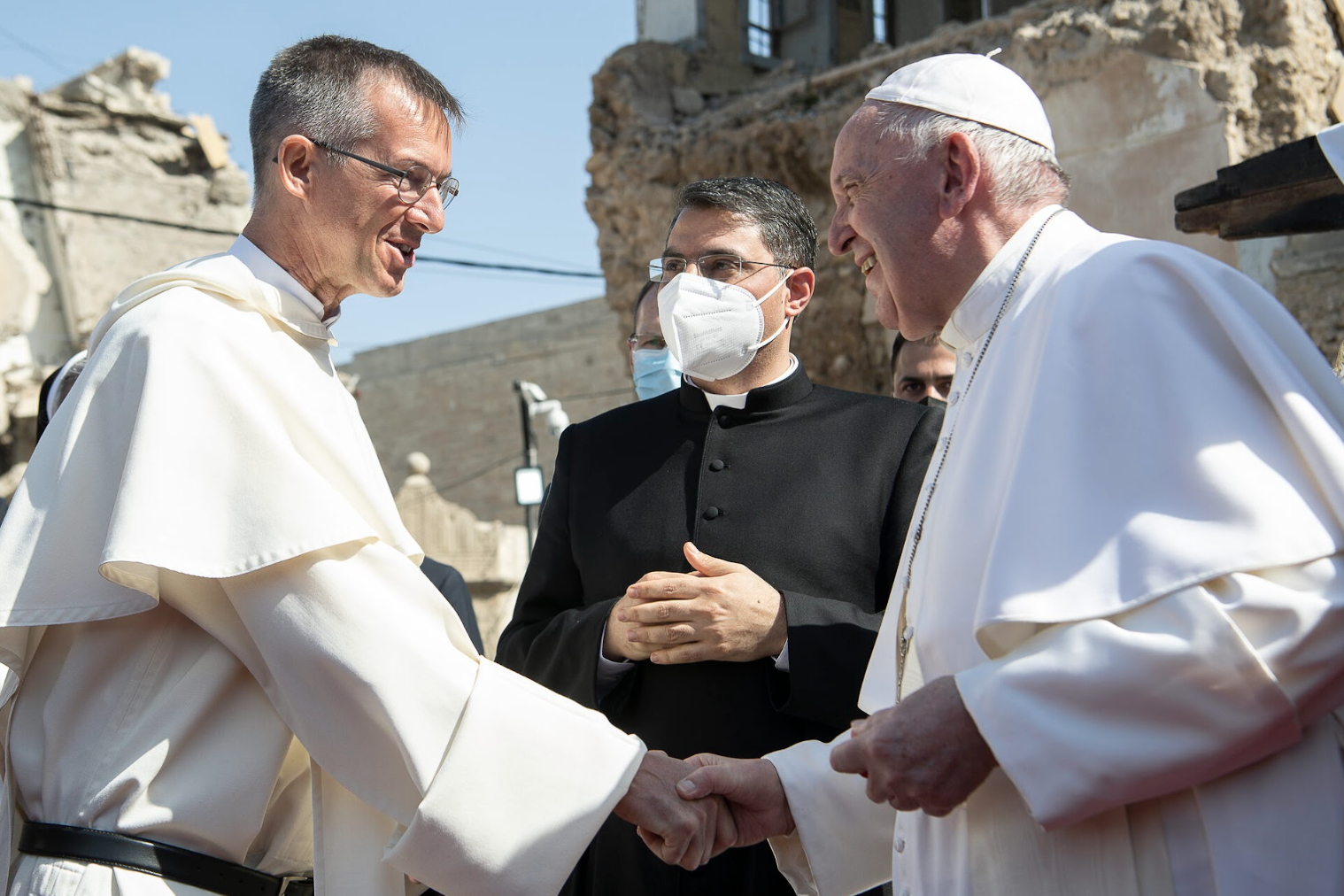
It’s striking how often monumental life decisions arise from seemingly chance events. For Father Olivier Poquillion, his journey into the Dominican order began with a teenage rebellious streak that landed him summer camp, old sailboats, and an encounter with a Dominican priest who taught him about teamwork, resilience, and spreading the Gospel by attraction, not proselytism.
During his priestly life, he has been a chaplain of the military, the police, the Scouts, the elderly, the sick, to the poor, and to those who are serving the poor. “Always preaching the Gospel, but always in different ways, engaging others not as a master but as a friend who talks to his friend,” he said.
The Dominicans first set foot in Mesopotamia in 1750 when Mongol Buddhism was the dominant religion. The friars and sisters—integral to the order—established a church, schools, and a hospital. Recognizing a lack of faith materials in the local language, they set up the region’s first printing house.
“They weren’t importing the truth but revealing it from within,” Father Olivier remarked during a month-long visit to Rome. “Mission is not about bringing truth from outside. We are called to recognize something of God in the local culture and highlight that as a bridge.”
Having once served in the French military and briefly pursued a law career, Father Olivier found material wealth but little fulfillment. Reflecting on life’s impermanence, he mused: “We will all face our mortality, and the pressing question will be: ‘What have you done for and with your brother?’” This profound introspection steered him towards missionary work.
Although he hails from a family of diplomats and judges and anticipated a life locked in a monastery upon joining the Dominican Order, God had other plans. He spent years as the General Secretary of the Commission of the Bishops’ Conferences of the EU (COMECE). This led to him living at airports, shuttling between meetings, and swapping suitcases during layovers.
In Iraq, Father Olivier’s tenure extended beyond mere religious instruction. He initially resided there from 2003-2005, shortly after the U.S. invasion. Despite facing threats, Christian communities remained integral to the bustling life in Mosul. By 2019, when he was again sent to Mosul following the rise and fall of the Islamic States (ISIS), the Christian demographic and the landscape drastically shifted, leading to extensive displacement.
Father Olivier played a pivotal role in restoring the Dominican convent of Notre-Dame de l’Heure, which ISIS heavily damaged, as part of UNESCO’s “Reviving the Spirit of Mosul” program.
In March of 2021, Pope Francis made history by becoming the first Pope to visit the land of Abraham, as a sign of solidarity to those who remained. The four-day trip included stops in five cities: Baghdad, Najaf, Mosul, Qaraqosh and Erbil.
“Fraternity is more durable than fratricide. Hope is more powerful than hate. Peace more powerful than war,” the Pontiff said, surrounded by both civil and religious leaders in Mosul, the administrative capital of Nineveh. For the past 2,500 years, the city has represented the pluralistic identity of Iraq. The rise of ISIS, and the war that followed, caused vast damage to the city’s skyline. Landmarks such as the Al-Hadba minaret of the Al-Nouri Mosque and the clock tower of the Notre-Dame de l’Heure convent, the first of its kind in the Middle East, were destroyed.
During his visit, Pope Francis defined the damaged structures as reminders of the “perennial human desire for closeness” to God. The clock, he added, “for more than a century has reminded passersby that life is short, and time is precious.”
Amidst the remnants of a city devastated by conflict, Pope Francis’s interactions were emblematic of the broader mission’s ethos. When he stopped to bless a local family, their subsequent conversation with Father Olivier revealed the universality of spiritual connections. Though they couldn’t identify the Pontiff nor that he is the Successor of Peter, they intuitively felt he was “a man of God who came and visited us.”
This encapsulates the essence of missionary work. It’s not about the projection of one’s beliefs onto others but the connections forged in shared humanity and faith. Father Olivier’s insight for budding missionaries mirrors this sentiment:
“Go, but bring a light suitcase, and begin by watching what is there: what matters, is not what you bring but what you discover because if you pay attention, you will see the face of God.”
Father Olivier’s journey, set against the backdrop of the papal visit, exemplifies faith’s transformative power in adversity. His commitment, mirrored by countless global missionaries, emphasizes the Gospel’s significance, prompting us to question: “Am I my brother’s keeper?” Father Olivier affirms that we are called to be. “We’re all aboard the same boat, as members of Holy People of God. My mission began as a Scout and evolved into serving as a Scout chaplain. We’re entrusted with the dual duty of loving God, which is straightforward, and our neighbors—a far more challenging endeavor.”
Read more stories in MISSION Magazine


